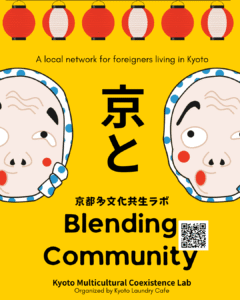京都における外国籍住民支援ネットワークの実態を探るExploring Support Networks for Foreign Residents in Kyoto
京都は世界有数の観光都市であり、多くの外国人観光客や留学生、移住者が集まる街です。しかし、その華やかな観光イメージとは裏腹に、定住外国人が安心して暮らすための支援体制は十分に整っているとは言えません。Kyoto is one of the world’s top tourist cities, attracting many international visitors, students, and migrants. However, behind its glamorous image as a tourist destination, the support systems for long-term foreign residents to live comfortably are still far from sufficient.
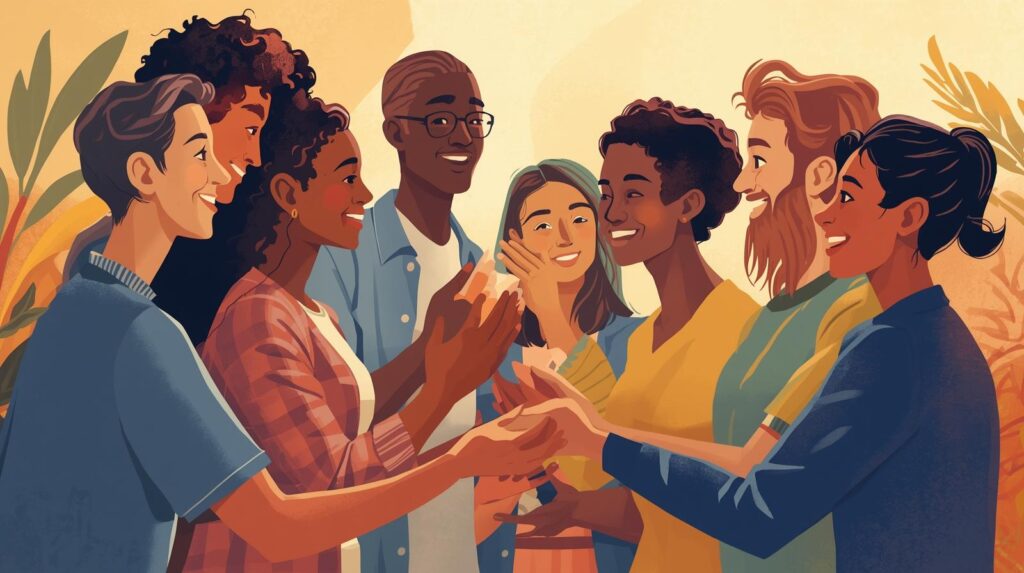
- 外国人住民の増加 Increase in Foreign Residents
京都市では、観光業や留学、技能実習などを背景に外国人住民が年々増加しています。特にアジア圏(中国、韓国、ベトナムなど)からの移住者が多く、地域社会の多様化が進んでいます。In Kyoto City, the number of foreign residents has been increasing year by year, driven by tourism, study abroad programs, and technical training. Many of these newcomers come from Asian countries such as China, South Korea, and Vietnam, contributing to the growing diversity of the local community. - 多文化共生施策の推進 Promotion of Multicultural Coexistence Policies
京都市は「多文化共生プラン」を策定し、外国人向けの生活相談窓口や日本語教室、多言語での情報発信などを行っています。また、国際交流イベントや地域の多文化フェスティバルも開催されています。
その一方で課題は…On the other hand, the challenges are…
- 言語の壁 Language Barrier
行政手続きや医療、教育など、生活のさまざまな場面で言語の壁が依然として大きな課題です。多言語対応が進んでいるものの、十分とは言えません。Language barriers remain a major challenge in many aspects of daily life, such as administrative procedures, healthcare, and education. While multilingual support has been improving, it is still far from sufficient. - 地域社会との交流不足 Lack of Interaction with the Local Community
外国人住民と日本人住民の交流が限定的で、孤立感を抱えるケースもあります。文化や習慣の違いから誤解やトラブルが生じることもあります。Interaction between foreign residents and Japanese residents is limited, and some experience a sense of isolation. Differences in culture and customs can also lead to misunderstandings and conflicts. - 就労・教育の格差 Employment and Education Disparities
外国人の就労環境や子どもの教育機会に格差が見られます。特に技能実習生や留学生の労働環境、日本語が十分に話せない子どもの学習支援が課題です。There are disparities in employment conditions and educational opportunities for foreign residents. In particular, the working environments of technical trainees and international students, as well as learning support for children who do not have sufficient Japanese language skills, remain key challenges. - 災害時の情報提供 Information Provision During Disasters
災害時に多言語で迅速かつ正確な情報を提供する体制が十分でない場合があり、外国人住民の安全確保が課題となっています。During disasters, systems for providing timely and accurate information in multiple languages are sometimes insufficient, posing challenges to ensuring the safety of foreign residents.
今回のインタビューは、京都における多文化共生の現状と課題を明らかにするために行われました。
お話を伺ったのは、中京区でコインランドリーカフェを拠点に国際交流活動を展開する「ブレンディングコミュニティ」代表の崔・山本理恵(さい・やまもとりえ)さんです。This interview was conducted to shed light on the current situation and challenges of multicultural coexistence in Kyoto.
We spoke with Rie Yamamoto (Sai), the representative of Blending Community, who runs international exchange activities based at her coin laundry café in Nakagyo Ward.
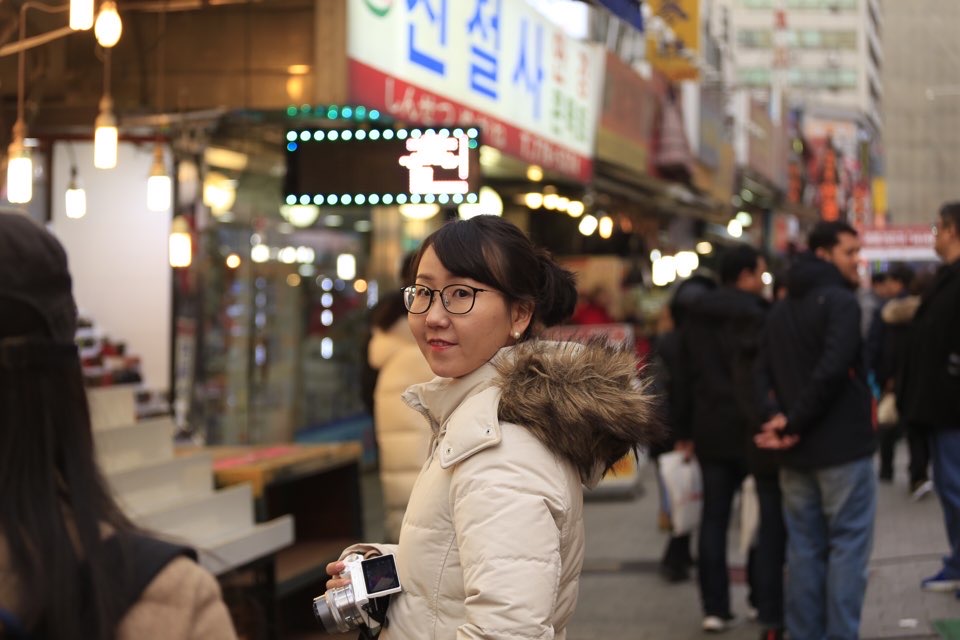
在日コリアンとしての生い立ち Life as a Zainichi Korean
崔さんは京都市壬生エリアで生まれ育ちました。小・中学校までは「山本」という通名を使用し、高校からは本名の「崔」を名乗るようになります。義務教育までは日本名(通名)を使い、高校から大学は私学の学校に入学したため、地域で気にすることなく本名に*変更する、という少々特殊な氏名の変遷を経験しています。基本的には、名前などは親の教育方針に従う形で、コリアンルーツを意識する場面は少なかったといいますが、名前や食事、法事という生活やしきたりの部分で「自分はみんなとは違うんやな」と感じたそうです。Sai was born and raised in the Mibu area of Kyoto City. She used the Japanese name “Yamamoto” through elementary and junior high school, but began using her real name, “Sai,” starting in high school. This shift was possible because she entered a private high school and later a private university, where there was less concern about using her Korean name within the local community.
Following her parents’ guidance, she generally did not have many opportunities to think deeply about her Korean roots during childhood. However, through everyday experiences such as her name, food, and family rituals, she recalls feeling, “I’m a bit different from everyone else.”
崔さん Sai
「完全に日本社会に溶け込んで、小学校、中学、高校、大学と普通に日本の学校で過ごしました。ただ、家や親族の中だけは、完全にコリアでした。」”I was completely immersed in Japanese society, attending regular Japanese schools all the way through elementary, junior high, high school, and university. However, at home and among my relatives, it was entirely Korean.”
就職差別との出会いと初めての挫折 Encountering Employment Discrimination and the First Major Setback
新卒で大手商社グループ企業に入社した際、崔さんは初めて自分のルーツが原因での差別に直面します。When Sai joined a major trading company group as a new graduate, she encountered discrimination for the first time because of her roots.
崔さん Sai
「職場でのいじめがありました。理由がわからなかったのですが、後から私が韓国籍であることへの嫌悪感が原因だと知りました。お弁当を隠されたり、無視されたり…。結局3か月で辞めざるを得ませんでした。」”There was bullying in the workplace. At first, I didn’t understand why, but later I learned it was driven by resentment toward my Korean nationality. My lunch was hidden, I was ignored… In the end, I had no choice but to quit after three months.”
この経験は崔さんにとって大きな人生の転機となりました。This experience became a major turning point in Sai’s life.
韓国での10年間:グローバル部署での仕事経験など Ten Years in Korea: Work Experience in a Global Department and Beyond
その後、出版社や法律事務所で働きながら、在特会のヘイトスピーチ問題に関わり、社会課題に目を向けるようになります。そして「自分はどこから来たのか、出自の秘密を知って感じたい」という想いから韓国へ渡航。
現地では多国籍のグローバルチームの一員として韓国企業の外国人雇用者として働く傍ら、国際交流会に参加したり、日本語教師として週末に教壇に立ったり、と活動を広げていきました。After that, while working at a publishing company and a law firm, Sai became involved in addressing hate speech issues led by far-right groups like Zaitokukai, which opened her eyes to broader social issues.
Driven by a desire to understand her origins and experience her roots firsthand, she decided to move to Korea. There, she worked as a foreign employee in a Korean company, serving as part of a multinational global team. At the same time, she expanded her activities by participating in international exchange events and teaching Japanese on weekends, gradually building connections across cultures.
京都ランドリーカフェ開業 Opening of Kyoto Laundry Café
父の死をきっかけに帰国した崔さんは、京都で「自分の店を持とう」と決意。日常生活が回る「洗濯」をキーワードに日本の地域の方々と様々な社会課題を抱えるコミュニティリーダーたちが集まり、街で暮らす普通の人々がやりたいことが実現できる場所を作りたい。そこに、暮らす外国人も自然に混ざって、同じ住民としてコミュニティを共有しあっていけたらと考えました。After her father’s passing, Sai returned to Kyoto and decided to open her own shop. Using “laundry,” a part of everyday life, as a key concept, she envisioned creating a place where local residents and community leaders tackling various social issues could gather, and where ordinary people living in the city could bring their ideas to life.
She hoped that foreign residents would naturally become part of this space, sharing the community as equal members of the neighborhood.
崔さん Sai
「会社勤めはもう限界でした。何か自分でできることを、と考えたときに、カフェとランドリーを組み合わせたスペースを思いついたんです。」”I had reached my limit with corporate life. When I thought about what I could do on my own, the idea of combining a café with a laundromat came to mind.”
こうして生まれたのが「京都ランドリーカフェ」。最初は語学教室や交流会を小さく始める場として運営していました。And so, Kyoto Laundry Café was born. In the beginning, it operated as a small space for language classes and cultural exchange gatherings.
ブレンディングコミュニティ誕生 Starting for Blending Community
交流会を続けるうちに、短期滞在ではなく、京都に定住する外国人が増えてきたことに気づきます。
「もっと生活面での支援が必要だ」と感じ、2024年4月に「ブレンディングコミュニティ」を立ち上げました。As the exchange gatherings continued, Sai noticed an increase in foreigners who were not just staying short-term but settling in Kyoto.
Realizing that more support for daily life was needed, she founded Blending Community in April 2024.
崔さん Sai
「正式なNPOや法人格ではなく、あくまで任意団体。友達同士が集まって助け合う、そんなイメージでスタートしました。」”It’s not an official NPO or legal entity, just a voluntary group. We started with the idea of friends coming together to help and support one another.”
京都に暮らす外国籍住民の現状とニーズ Current Situation and Needs of Foreign Residents Living in Kyoto
B2B型ビジネスと孤立 B2B Businesses and Isolation
京都では、飲食店などで日本人客と直接関わるB2C型ビジネスよりも、B2B型の事業が多いといいます。
そのため、日本語ができなくても生活できてしまい、地域との接点が極端に少なくなる傾向があります。In Kyoto, there are more B2B businesses than B2C businesses, such as restaurants that directly serve Japanese customers.
As a result, many foreign residents can get by without speaking Japanese, which often leads to very limited interaction with the local community.
崔さん Sai
「京都は日本でも有数の観光地なので、特有の事情があります。日本語が全くできない形で起業しても、自国から自国の客を呼び寄せて、ビジネスを回してしまうので、日本社会との関わりがほとんど生まれません。」”Kyoto is one of Japan’s top tourist destinations, so it has its own unique circumstances. Even if someone starts a business without knowing any Japanese, they can bring in customers from their own country and keep the business running, which means there’s almost no interaction with Japanese society.”
在日外国人の孤独とメンタルヘルスの問題 Loneliness and Mental Health Issues Among Foreign Residents in Japan
地域とつながれないまま生活する外国籍住民は、孤独を深め、メンタル不調に陥るケースも多いといいます。Foreign residents who live without connections to the local community often experience deepening loneliness, which can lead to mental health struggles.
崔さん Sai
「英語が話せる精神科医がいるクリニックを探してほしいと相談がありました。孤独ケアは今後の大きな課題です。」”I once received a request to help find a clinic with a psychiatrist who speaks English. Addressing loneliness will be a major challenge moving forward.”
離婚・在留資格・経済基盤の複雑さ Complexities of Divorce, Residency Status, and Economic Stability
国際結婚が破綻した場合、在留資格を失い、日本に住めなくなるケースも少なくありません。
これが経済的・精神的な困難を同時に引き起こし、社会からの孤立を深めます。When an international marriage falls apart, it is not uncommon for one partner to lose their residency status and no longer be able to live in Japan.
This often triggers both financial and emotional hardships, deepening their isolation from society.
支援ネットワークの現状と課題 Current State and Challenges of Support Networks
京都は「つなぎ役」が不足 Kyoto’s Lack of “Bridge-Builders”
大阪府の生野区や箕面市などでは、行政と市民団体が連携した国際交流センターが機能しています。
しかし京都では、つなぎ役となる団体がほぼ存在していないのが現実です。In areas like Ikuno Ward and Minoh City in Osaka Prefecture, international exchange centers operate through collaboration between the government and community organizations.
However, in Kyoto, the reality is that there are almost no organizations serving as bridge-builders to connect these groups.
崔さん Sai
「行政の国際交流会館はありますが、年2回のイベントが中心。暮らしている外国人向けの継続的な寄り添いは見えにくいですね。その一方でインバウンドなど、観光業で稼ごうという方々ばかりが集まってきます。」”There is a government-run international exchange center, but it mainly holds events twice a year. Ongoing, close support for foreign residents living here is hard to see.
Meanwhile, the focus tends to be on people coming together to make money through inbound tourism.”
デジタルは活発、リアルは希薄 Active Online, Weak Offline Connections
FacebookグループやMeetupを通じた交流は活発ですが、オンラインも多く、一時的なパーティで終わるケースも多いです。実際に顔を合わせる支援モードの国際団体や多文化共生の視野を持った活動グループは非常に少ないといいます。交流 through Facebook groups and Meetup is active, but much of it remains online or limited to temporary parties and gatherings.
There are very few international organizations or activity groups with a multicultural coexistence perspective that provide ongoing, face-to-face support.
崔さん Sai
「情報はネットにあふれています。引越しの不要物の交換掲示板をはじめとする宿関連や交流グループは数多とあります。でも、実際にリーダーが実在してて、顔が見えている活動かというと…ほとんどないんですよね。」”Information is overflowing on the internet. There are countless housing-related and exchange groups, including message boards for trading unwanted items when moving.
But when it comes to whether there are actual leaders, real people you can see and connect with… there are almost none.”
ブレンディングコミュニティが目指す未来 The Future Vision of Blending Community
孤独ケアを中心とした活動 Activities Focused on Combating Loneliness
崔さんが特に力を入れたいと考えているのが、孤独問題への対応です。
言語や文化の壁を超えて、誰もが気軽に相談できる「居場所」を作ることを目指しています。友活のためのコミュニティづくりに取り組んでいます。Sai is particularly focused on addressing the issue of loneliness.
Her goal is to create a safe and welcoming space where anyone can easily seek advice, regardless of language or cultural barriers. She is also working to build communities that foster friendships and meaningful connections.
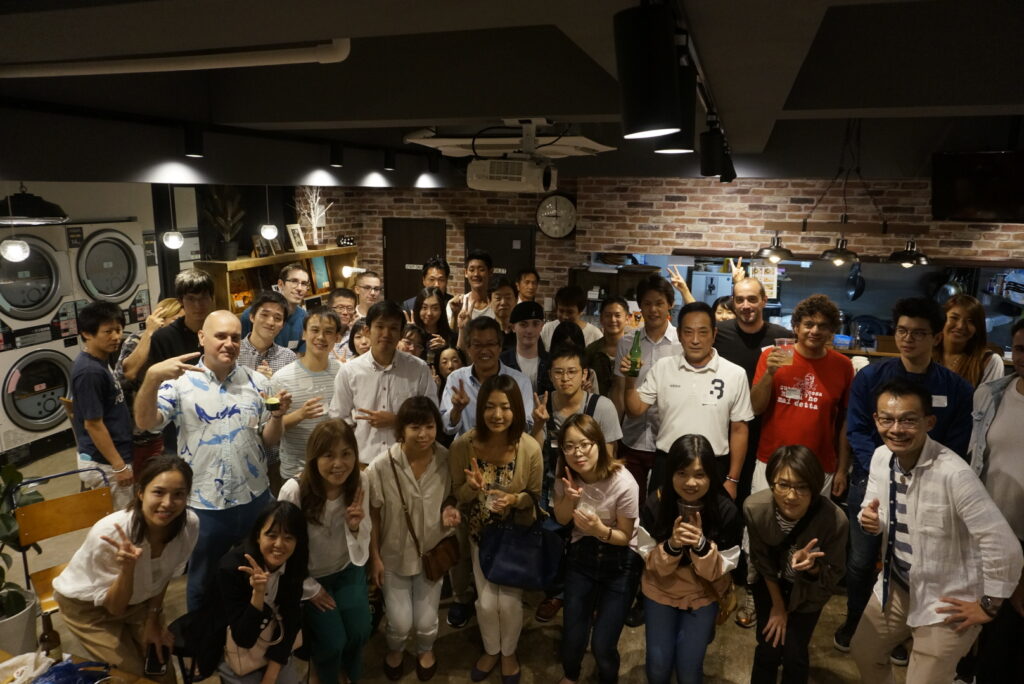
生活相談窓口の拡充 Expansion of Community Support Services
日本語が不自由でも気軽に利用できる生活相談窓口を設けることも今後の目標の一つです。「多文化共生センター」構想としては、最終的に、行政と民間が協力して運営する「多文化共生センター」を京都に作りたいと崔さんは語ります。One of Sai’s future goals is to establish community support desks where people can easily seek help, even if their Japanese is limited.
As part of her vision for a “Multicultural Coexistence Center,” she ultimately hopes to create a center in Kyoto operated through collaboration between the government and private sectors.
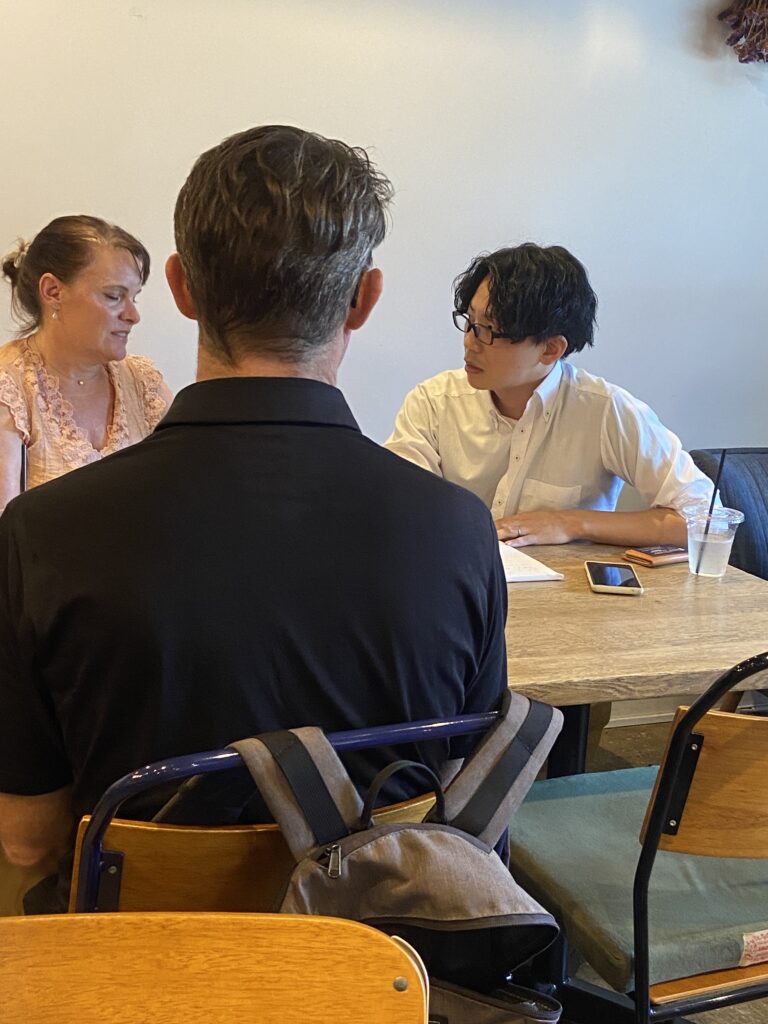
京都は世界から多くの人が集まる都市でありながら、定住外国人の支援体制はまだ発展途上です。
ブレンディングコミュニティは、「友達集団」として始まった小さな取り組みですが、そこには京都に暮らす外国籍住民の生活を支える大きな可能性が秘められています。Kyoto is a city that attracts people from all over the world, yet the support system for long-term foreign residents is still in its early stages.
Blending Community began as a small group of friends, but it holds great potential to support and enrich the lives of foreign residents living in Kyoto.
京都の未来を支える多文化共生の取り組みは、これからが本当の始まりです。The efforts toward multicultural coexistence that will shape Kyoto’s future are only just beginning.
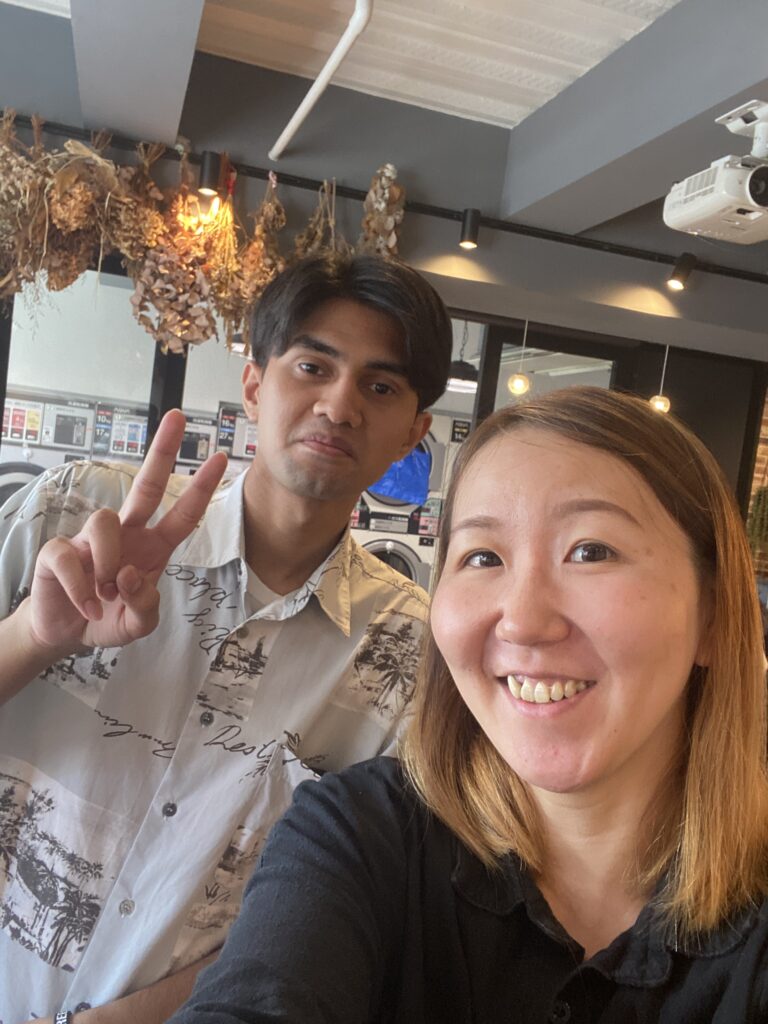
| 聞き手 ウィジェナヤケ・ジョン・ライアン 特定非営利活動法人 glolab コーディネーター Interviewer: Wijenayake John Ryan Coordinator, Non-Profit Organization glolab 大阪生まれ大阪育ち。スリランカとフィリピンにルーツを持つミックス/移民2世で、元ヤングケアラー/現若者ケアラー。立命館大学産業社会学部在学。人権・差別問題についてのゲストスピーカー活動やNPOでの啓蒙活動、移民ルーツの居場所を作るプロジェクトなどに関わる。 Born and raised in Osaka, Ryan is of mixed heritage with roots in Sri Lanka and the Philippines, and is a second-generation immigrant. He is a former young caregiver and currently a youth caregiver. Ryan is studying at Ritsumeikan University’s College of Social Sciences. He is involved in guest speaking activities on human rights and discrimination issues, awareness-raising work with NPOs, and projects that create safe spaces for individuals with immigrant backgrounds. |
ーこのインタビューは立命館大学産業社会学部社会調査士課程の社会調査実習の一環として実施されましたー
